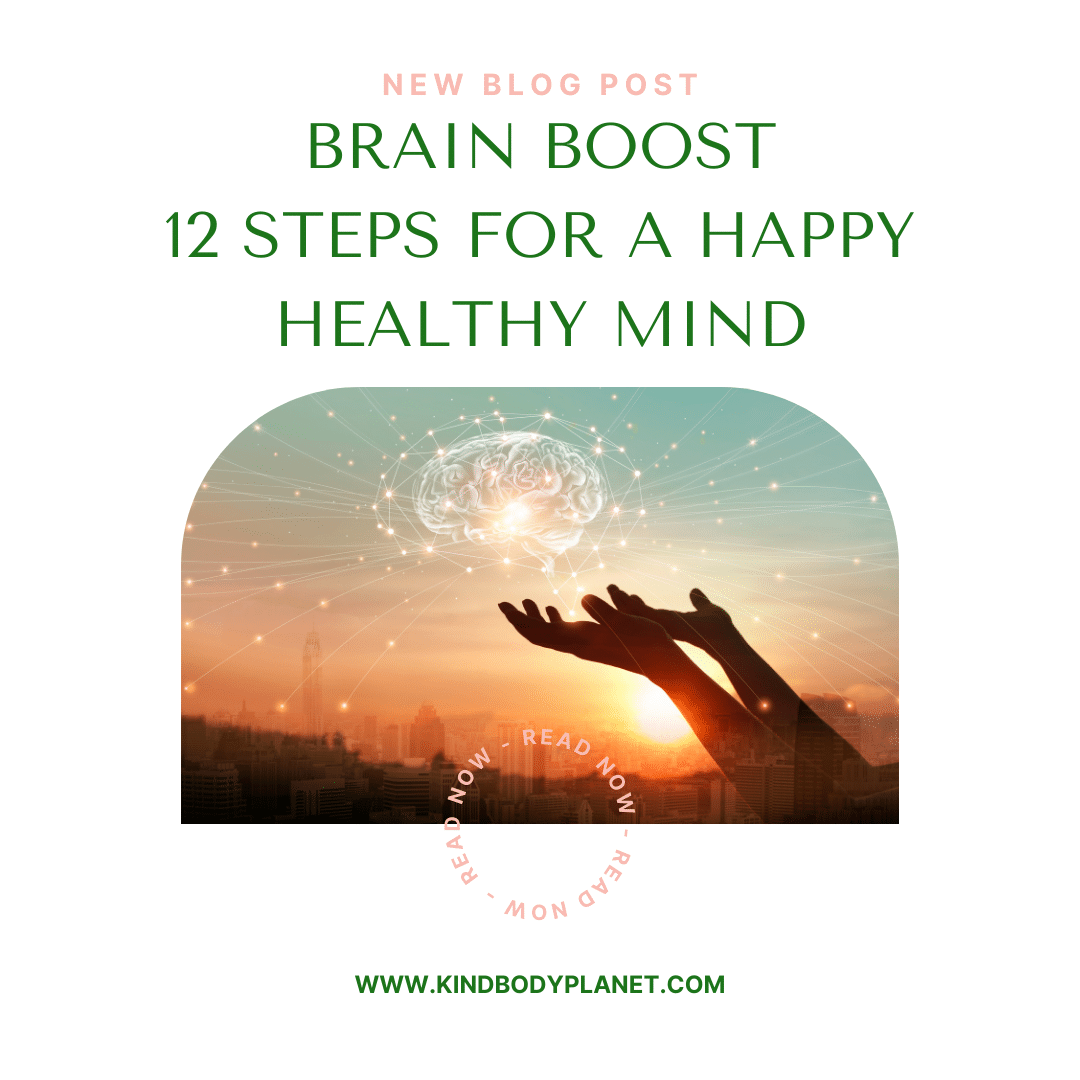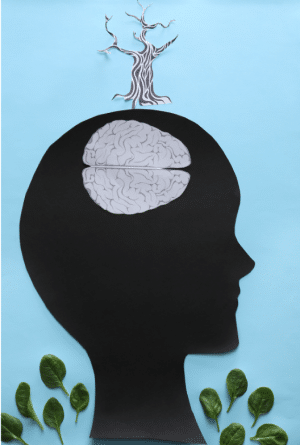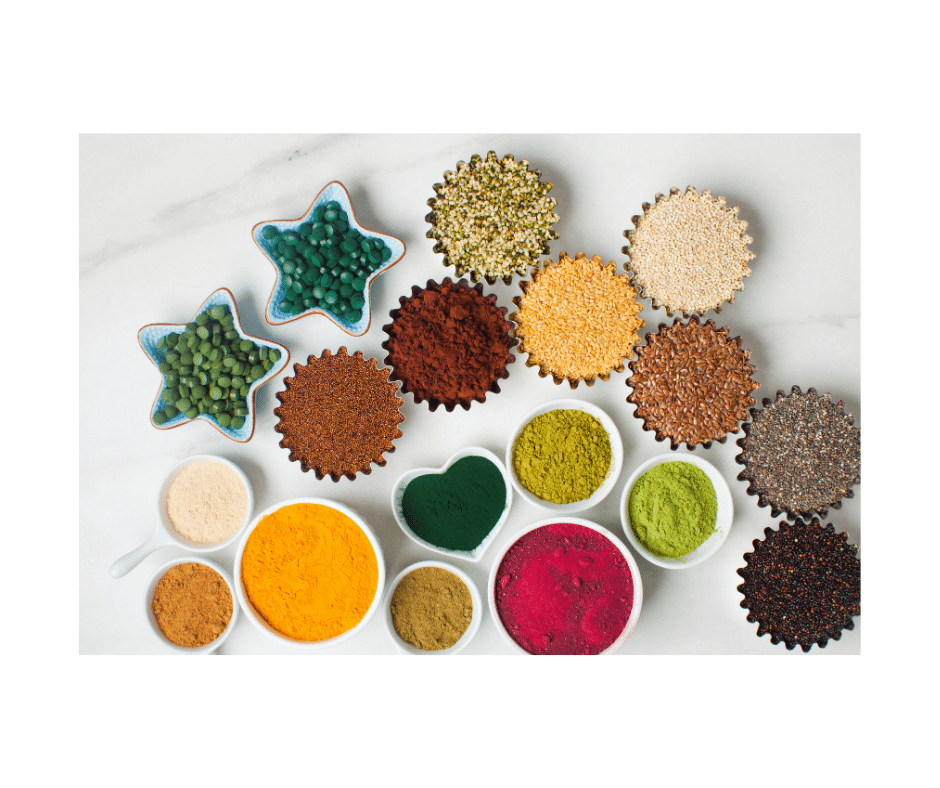
18 Jun Brain Boost -12 Steps for a Happy, Healthy Mind
Let’s talk about Mind health and fitness. We tend to pay more attention to the health of our body than we do the health of our brain but as they are undeniably linked, we really need to learn to love our brain more and, in the process, care for our mind’s health. Just as there are many things you can do to preserve the health of your body, you can also take steps to preserve your cognitive abilities. You have more control over your brain health than you might think.
Taking the right steps today can help to avoid serious issues, like stroke and Alzheimer’s disease later down the road.
You can’t live without your brain, and you’ll struggle to enjoy life with a compromised brain. So let’s look after that beautiful mind. The future of your brain health largely depends on what you do today.

Boost your brain health today with these strategies:
1. Get enough sleep.
Your body and brain don’t function properly without sleep. A lack of sleep is stressful for every component of your body. Healing and recovery occur during sleep. Your brain isn’t at its best if you’re not getting enough sleep each night.
If you struggle to sleep at night try the following tips:
Set a sleep schedule and stick to it. Our bodies adapt very quickly to our
sleeping habits. Notice that if you stay up late and eat, your digestion tends to run riot. Your body is much more efficient at sleeping and preparing for sleep if you can maintain a schedule.
Try to get 6-9 hours of sleep to function optimally. Studies have shown that sleeping more than 9 hours or less than 6 hours is associated with feelings of anxiety and sadness. Even one night of low quality or quantity sleep is associated with insulin resistance, a major cause of type-2 diabetes. Those that sleep less than 6 hours are also far more likely to develop high blood pressure. If you find you need more than 9 hours and can’t sleep more than 6, a visit to your Doctor or Naturopath is advised.
Keep your bedroom cool. Your body temperature drops as you near bedtime and is at its lowest during sleep. If the room is too warm, your body won’t be able to cool down. Sleep quality is improved in a cool sleeping environment. You’ll have to play around with the temperature to find what’s ideal for you.
Avoid alcohol. Alcohol can help you fall asleep, but sleep quality is compromised. It has been shown that sleep is less restful, and you may wake up more often during the night, even if you don’t remember it. For some reason, the negative effects of alcohol are more pronounced in women.
Darken the room. Even the light from your alarm clock can compromise the quality of your sleep. Remove as much artificial light from your sleeping environment as possible. Turn off the computer screen and minimize any ambient light coming from outside the room.
Ensure you get enough vitamin B6, calcium and magnesium. Vitamin B6 is needed to synthesize melatonin, which is vital to sleep. Calcium deficiency has been shown to increase the amount of time it takes to fall asleep. Magnesium intake is associated with the ability to stay asleep.
How’s your mattress? Even the highest quality mattress has lost as much as 75% of its support after 10 years. You probably spend more time sleeping than you do on any other single activity. Be certain you have a good mattress. Purchase the best mattress you can afford.
Try not to exercise within 3 hours of your bedtime. Exercise is great for increasing the quality of sleep and decreasing the amount of time
required to fall asleep. However, studies have shown that 3 hours is the cut-off point to prevent exercising from decreasing sleep quality.
Try a warm – (not hot) bath or shower before bed to relax body and mind
Take a warm non caffeinated ‘sleepy tea’ drink – something that will relax you.
On cold nights heat your bed gently before you go to bed with a water bottle, or a heated blanket (but not too hot) and don’t forget to turn it off before going to sleep!
Dial down the stress, meditate or use an essential oil like lavender to gently calm the senses.
Set a sleep schedule and stick to it. Our bodies adapt very quickly to our
sleeping habits. Notice that if you stay up late and eat, your digestion tends to run riot. Your body is much more efficient at sleeping and preparing for sleep if you can maintain a schedule.
Try to get 6-9 hours of sleep to function optimally. Studies have shown that sleeping more than 9 hours or less than 6 hours is associated with feelings of anxiety and sadness. Even one night of low quality or quantity sleep is associated with insulin resistance, a major cause of type-2 diabetes. Those that sleep less than 6 hours are also far more likely to develop high blood pressure. If you find you need more than 9 hours and can’t sleep more than 6, a visit to your Doctor or Naturopath is advised.
Keep your bedroom cool. Your body temperature drops as you near bedtime and is at its lowest during sleep. If the room is too warm, your body won’t be able to cool down. Sleep quality is improved in a cool sleeping environment. You’ll have to play around with the temperature to find what’s ideal for you.
Avoid alcohol. Alcohol can help you fall asleep, but sleep quality is compromised. It has been shown that sleep is less restful, and you may wake up more often during the night, even if you don’t remember it. For some reason, the negative effects of alcohol are more pronounced in women.
Darken the room. Even the light from your alarm clock can compromise the quality of your sleep. Remove as much artificial light from your sleeping environment as possible. Turn off the computer screen and minimize any ambient light coming from outside the room.
Ensure you get enough vitamin B6, calcium and magnesium. Vitamin B6 is needed to synthesize melatonin, which is vital to sleep. Calcium deficiency has been shown to increase the amount of time it takes to fall asleep. Magnesium intake is associated with the ability to stay asleep.
How’s your mattress? Even the highest quality mattress has lost as much as 75% of its support after 10 years. You probably spend more time sleeping than you do on any other single activity. Be certain you have a good mattress. Purchase the best mattress you can afford.
Try not to exercise within 3 hours of your bedtime. Exercise is great for increasing the quality of sleep and decreasing the amount of time
required to fall asleep. However, studies have shown that 3 hours is the cut-off point to prevent exercising from decreasing sleep quality.
Try a warm – (not hot) bath or shower before bed to relax body and mind
Take a warm non caffeinated ‘sleepy tea’ drink – something that will relax you.
On cold nights heat your bed gently before you go to bed with a water bottle, or a heated blanket (but not too hot) and don’t forget to turn it off before going to sleep!
Dial down the stress, meditate or use an essential oil like lavender to gently calm the senses.
Sleep is an important part of maintaining health and enjoying life. If you’d enjoy sleeping more like a baby, keep these tips in mind. Maintain a regular sleeping schedule and ensure that your sleeping environment supports peaceful sleep.
2. Have positive relationships.
Your brain is healthier if you interact with other people in a positive way. Negative relationships have a negative impact on your brain. Spending too much time alone isn’t good for your brain either. Spend time with people you enjoy. Try to keep a strong support system. You can keep in touch with your social network through email, social groups, joining clubs, by phone, writing letters, attending hobbies or social groups such as cooking class or book clubs, volunteering, discussion groups and more.
3. Avoid alcohol and tobacco.
It’s no secret that consumption of alcohol and tobacco can both have negative health consequences. Limit your use of these items as much as possible. As we mentioned above, too much alcohol disrupts sleep but can also lead to memory loss. Smoking robs the body of oxygen and we all know that oxygen is essential for all our body functions.
4. Be mentally active each day.
Do something each day to challenge your brain. Brains develop when challenged. The loss of cognitive ability due to age can be slowed, too. There are plenty of activities to choose from:
- Crossword puzzles, Sudoku, or any other brain puzzle
- Chess
- Study a new language.
- Study a musical instrument.
- Write: novel, journal, blog, poem.
- Play cards.
- Count backward from 500 by sevens.
- Do math problems.
- Go back to school and take a class.
- Read
- Study something new / Go back to school
- Take up a new hobby
- Switch hands for tasks, using your less dominant hand stimulates the brain
- Travel, explore and learn about new cultures. Travel broadens the mind and breaks routine.

5. Pay attention to your diet.
The food you put into your body ultimately becomes your body. Also, what you expose your body to on a daily basis, what you are breathing in and absorbing. Think about that. Your body is composed of the things you eat, drink, and breathe. Better building blocks equal a better brain. The foods you eat matter tremendously. Limit or eliminate the following to keep your mind in good health:
Fast Foods – Avoid heavily processed foods, preservatives, Artificial ingredients. Avoid Hydrogenated oils and margarine.
Eat as close to the source as possible and as whole food as possible. Reduce table salt and refined white sugar. Refined sugar causes strong fluctuations in blood sugar levels resulting in a whole host of issues, especially cardiovascular and cholesterol issues. Stick to natural sweeteners like Agave, Maple syrup, Dates or Stevia.
Avoid High Fructose corn syrup – It tricks your brain into thinking you’re hungry when you’re not.
Replace saturated fats from animal products with monounsaturated fats from healthy vegetable oils like Avocado and extra virgin olive oil. Also nuts such as Almonds, hazelnuts and pecans and seeds such as sesame and pumpkin are great.

Reduce caffeine but not necessary altogether as some studies have shown that a little caffeine may actually be beneficial for the brain.
Avoid heavy metals and environmental pollutants. Heavy metals such as lead and mercury are particularly bad for your body and brain. Avoid Mercury and lead found in fish and also contact to lead often found in pipes in older houses. Lead has also been found in certain minerals such as calcium and magnesium as well as various powdered plant sources such as turmeric, cacao powder, greens etc. It is important therefore to source these valuable supplements from the reputable suppliers and those who test for lead.
Consumerlab.com is an interesting source for information on these topics.
6. Look at taking some supplements to support your system.
Would it not be great if you could just pop a pill and remember everything for an exam? Realistically, there are no supplements that can boost your brain power to such astounding levels, but studies have shown that regular intake of certain supplements increases the ability to memorise. There are many herbs, supplements and foods that can improve your brain; the effect of which can mean improvement of memory, learning, concentration, attention, reasoning, social skills, decision making, and focus. If you can combine these ‘brain foods’ with sufficient rest and exercise, you will have boosted your brainpower in no time. The brain requires a variety of nutrients to produce neurotransmitters – these are substances that control mood, behaviour, heart rate, learning, concentration, breathing and so much more. Studies have proved beyond doubt that nutritional supplements increase IQ and enhance learning ability. ‘Smart nutrients’ (cognitive enhancing supplements) are natural substances that improve human intelligence.
Below are some brain boosting supplements to consider:
Ginkgo Biloba:
This substance has been used for thousands of years in Eastern cultures and is perhaps the most well-known of all memory enhancing herbs. It works by dilating the blood vessels in the brain and enhancing blood flow to the brain; thus supplying lots of oxygen to the brain. It also gets rid of harmful free radicals that damage brain cells. However, the results are not immediate. Taking the supplement continuously for a few weeks will start yielding results.
Green Tea and Black Tea:
Recent research has shown that these common constituents of the kitchen are very effective in combatting the dreaded Alzheimer’s disease. The most significant result seems to be that these prevent the breakdown of acetylcholine. This is a key chemical involved with memory and is often lacking in Alzheimer’s patients. The effect of green tea is more lasting than that of black tea, which lasts only for a day. Matcha is a super concentrated green tea for an extra boost.
Sage and Rosemary:
A recent study shows that students who took sage performed better at a memory recall test. Scientists believe that sage contains substances that may increase levels of a chemical that transmits messages to the brain. Rosemary also helps stimulate the memory and alleviate mental fatigue. It also strengthens mental clarity. How exactly these substances help the brain remains ambiguous, but many report them effective.
Vitamin B Supplements:
A healthy diet should provide you with all the vitamins that are needed by the body. But at times of stress and fatigue, the body gets depleted of Vitamin B. This deficiency prevents the functioning of acetylcholine. Vitamin B also helps carry oxygen to the brain and this does away with harmful free radicals. Some natural foods like soybeans, lentils, and green beans are rich in Vitamin B. Vitamin B Supplements also help to boost the level of these vital vitamins in the body.
Iron and Vitamin C
The most common deficiency in most parts of the world is linked to iron deficiency. Poor concentration, diminished intelligence, and a short attention span are all attributed to iron deficiency. Iron helps carry oxygen to the blood and its deficiency leaves the brain sadly lacking in oxygen. Iron deficiency can be detected by a simple blood test. Iron-rich food like spinach, oats, pumpkin seeds, swiss chard, beans, iron-fortified cereals, and iron supplements help raise the levels of iron. But absorption of iron becomes possible only in the presence of vitamin C. Garnishing iron-rich food with lime juice is one of the most effective and natural ways to ingest Vitamin C with iron.
Omega 3, Lecithin and Vitamin E
The Omega – 3 fatty acids EPA and DHA are critical for normal brain function and development throughout all stages of life. Lecithin breaks down bad cholesterol and helps blood pressure too. Vitamin E is a powerful brain boosting antioxidant. Vitamin C used with Vitamin E also boosts brain power.
Water – Not a supplement but an essential
Do not forget water – This is hugely important.
Water is an often overlooked but essential necessity of the brain. DENT Neurologic Institute stated in an article recently ‘About 75% of the brain is made up of water. This means that dehydration, even as small as 2% can have a negative effect on brain functions’.
A dehydrated brain works at a slower pace. Therefore, it is necessary to keep the brain hydrated with plenty of water.
7. Lower your blood pressure.
High blood pressure has several negative consequences. Among those is damaging the lining of the blood vessels, including those in your brain. This greatly contributes to the likelihood of suffering a stroke, along with many other catastrophic health issues.
8. Lower your blood sugar.
High blood sugar is also damaging to the lining of blood vessels. If you have blood sugar issues, it’s important to see your doctor and address it immediately.
- High blood pressure, high cholesterol, and high blood sugar tend to go together. It can be a dangerous combination.
9. Physical Exercise.
Exercise is good for your brain and body. You already know that you should be exercising, so make sure that you’re staying active. Join a gym and hire a trainer if necessary. – Walking, rebounding, swimming, cycling, yoga, tai chi, dancing, tennis , pilates, golf and running are some fun ways to get your body and mind fit.
10. Reduce stress.
Keeping stress levels in check is important for balance in body and mind. Below are a few ideas on how to work towards a happier, stress free mind.
Keep in touch with your emotions – address anger, upset, worry, sadness and loneliness. Identify your emotions and practice acceptance.
Take a relaxing bath. A nice 15 mins soak will leave you feeling relaxed and refreshed.
Meditate – This improves focus and stress relief – it also aids the building of new neural pathways.
Breathwork and relaxation exercises improve immunity and reduce stress. Deep yogic breathing serves as relaxation and oxygenates both body and brain.
Smile and laugh often – this helps you feel better and affects those around you positively too.
Interact with animals. Pets are wonderful at calming the nervous system and this is healing to our body and brain. If you don’t have a pet consider a rescue centre or get out into nature and connect with animals outdoors.
11. Stimulate your senses
Try Aromatherapy or Massage for a sensory experience. These have been shown to calm the body-mind and aromas trigger the brain as well as certain oils being good for cognitive function.
Try New foods – Thai, Indian, Vegan etc New sensations and tastes excite our mind and body.
Try Chai tea infused with spices and non-dairy milk to awaken your tongue and mind.
Garden. Reach your hands into the earth, plant herbs and flowers, listen to the sounds of mother nature, connect with your surroundings and the creatures outdoors.
Walk in nature and sun gaze for a while, be mindful of all that is around you.
Eat food and taste herbs you have grown and appreciate the colours, aromas and beauty of flowers that you nurture.
12. Love and Sex
So this one is no brainer, smile. Love yourself, care for yourself. This is healing to the body and mind. Making love stimulates your senses and sharpens your mind through its cardio-vascular benefits. It’s also connecting and feels great.
Summary – For great brain health be mindful of how you nourish yourself – mentally, emotionally, physically, spiritually, energetically and environmentally.
Many of the things that help your body, such as exercise and a healthy diet, are also good for your brain. You can achieve two things at once. Live a healthy lifestyle and keep your brain active. You must exercise it if you want it to be at its best. The quality of your everyday life as well as, well into retirement, largely depends on the quality of your brain health!
Make the most of it and have a whole lot of fun in the process.



No Comments